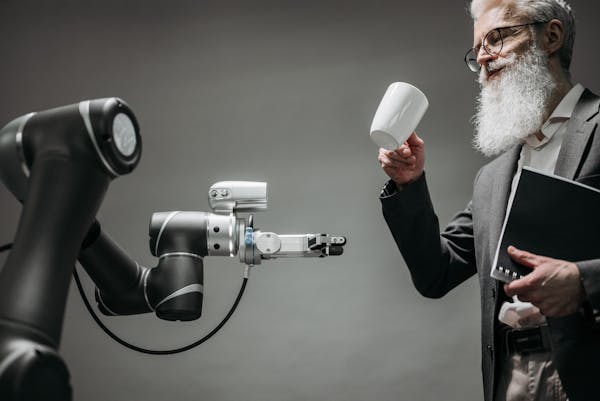Artificial Intelligence in medical field
Artificial intelligence (AI) is increasingly being used in the medical field to help doctors and other healthcare professionals diagnose and treat patients. AI can be used to analyze images, such as X-rays and CT scans, and to make predictions about a patient’s health. AI can also be used to help doctors identify patterns in a patient’s medical history that may be indicative of a certain condition. In addition, AI is being used to develop new treatments for diseases. For example, Google’s DeepMind Health subsidiary is working on using AI to detect and treat cancer.

Artificial intelligence (AI) is being increasingly used in the medical field to help doctors and other health care professionals with a variety of tasks. For example, AI can be used to help identify diseases and match patients with the most appropriate treatments. AI can also be used to help plan surgeries and track patients’ health over time.
There are many potential benefits of using AI in medicine. AI can help to improve the accuracy of diagnoses, as well as the efficiency of care. AI can also help reduce the cost of care by automating tasks that are currently performed by human health care workers. In addition, AI can help to improve patient safety by reducing the need for human error in the delivery of care.
AI is still in its early stages of development in the medical field, and there are many challenges that need to be addressed before it can be widely adopted. For example, it is important to ensure that AI systems are able to operate safely and effectively in a medical setting. In addition, it is important to ensure that AI-based systems are able to protect the privacy of patients and their medical data.
1. The potential of artificial intelligence in the medical field.
The potential of artificial intelligence (AI) in the medical field is vast. AI has the potential to revolutionize the way we diagnose and treat diseases. AI can help us to better understand the cause of diseases and to find new and more effective treatments. AI can also help us to improve the efficiency of medical care and to reduce its costs.

The potential of artificial intelligence in the medical field is vast. AI has the potential to revolutionize the way we diagnose and treat disease. It has the ability to provide insights that would otherwise be unavailable, and to do so at a much lower cost.
AI can help us to better understand the root causes of disease, and to develop more effective treatments. It can also help us to more accurately predict which treatments will work best for individual patients.
AI is already being used in the medical field, and its potential is only beginning to be realized. In the future, AI will likely play an even larger role in improving the quality of healthcare.
2. How artificial intelligence can be used to diagnose and treat diseases.
Artificial intelligence (AI) is increasingly being used to diagnose and treat diseases. AI can be used to create models of disease that can be used to make predictions about how a disease will progress. AI can also be used to identify patterns in data that can be used to diagnose a disease. AI is also being used to develop new treatments for diseases.

Artificial intelligence (AI) is showing great promise in the field of medicine. AI can be used to diagnose and treat diseases more accurately and efficiently than ever before. In the future, AI may even be able to prevent diseases from occurring in the first place.
3. The advantages of using artificial intelligence in the medical field.
Artificial intelligence has a number of advantages in the medical field. First, AI can help doctors diagnose diseases more accurately. AI can also help doctors predict how a disease will progress and what treatments will be most effective. AI can also help to improve the efficiency of medical research by helping to identify trends and patterns. Finally, AI can help to improve the quality of patient care by providing personalized recommendations for treatment and care.
Artificial intelligence has the potential to revolutionize the medical field. AI can be used to diagnose and treat diseases, plan surgeries, and even predict patient outcomes. AI can also help reduce the cost of healthcare and improve patient care.
4. The disadvantages of using artificial intelligence in the medical field.
There are four main disadvantages to using artificial intelligence in the medical field. First, there is the potential for error. Artificial intelligence is not perfect and there is always the possibility that it will make a mistake. Second, artificial intelligence can be expensive. Third, artificial intelligence may not be able to replicate the human brain. Finally, artificial intelligence may have difficulty understanding and empathizing with patients.
The disadvantages of using artificial intelligence in the medical field are that it can lead to over-diagnosis, it can be difficult to replicate results, and it can be expensive.
The disadvantages of using artificial intelligence in the medical field are many. One of the biggest is that it can lead to over-diagnosis, which can cause patients to be unnecessarily anxious and/or to receive unnecessary treatment. Additionally, AI can also lead to missed diagnoses, as it can sometimes be inaccurate. Another downside is that AI can be expensive to implement and maintain, and it may not be covered by insurance. Finally, some people may be concerned about the ethical implications of using AI in medicine, as it could potentially be used to make life-or-death decisions.
There are a number of potential disadvantages to using artificial intelligence in the medical field. One concern is that AI could potentially be used to make decisions about patient care that are not in the best interest of the patient. For example, if a computer program is used to make decisions about which treatments to recommend, it could potentially recommend treatments that are less effective or even harmful to the patient.
Another concern is that AI could be used to replace human doctors and other medical professionals. This could lead to a loss of jobs for medical professionals, and it could also potentially lead to a decline in the quality of care that patients receive. Additionally, AI could be used to automate tasks that are currently performed by human medical professionals, such as diagnostic testing and medical recordkeeping. This could lead to errors and inaccuracies in the medical records, which could in turn lead to negative health outcomes for patients.
5. The future of artificial intelligence in the medical field.
Artificial intelligence (AI) has already begun to transform the medical field in a number of ways. Its potential applications are vast, and its impact is already being felt in areas such as diagnostics, treatment planning, and drug development.
AI’s ability to analyze large data sets quickly and accurately is making it a valuable tool for medical diagnosis. For example, AI is being used to identify patterns in medical images that can indicate the presence of disease. AI is also being used to analyze patient data to identify early signs of illness and to predict how diseases will progress.
AI is also being used to develop new treatments for diseases. For example, AI is being used to design personalized cancer treatments that are tailored to the unique characteristics of each patient’s tumor. AI is also being used to develop new drugs and to identify existing drugs that can be repurposed for new uses.
The future of AI in medicine is likely to be even more transformational. As AI technology continues to improve, its applications in medicine will become more sophisticated and widespread. AI will likely play a role in virtually every aspect of medicine, from diagnosis and treatment to drug development and health care delivery.
In the medical field, artificial intelligence (AI) is being used or developed for a wide variety of tasks. These tasks include, but are not limited to, providing diagnoses, recommending treatments, assisting surgeons, and providing patient care.
The use of AI in the medical field has the potential to revolutionize healthcare. AI can be used to process and interpret large amounts of data quickly and accurately. This data can be used to improve diagnoses, recommend treatments, and predict patient outcomes.
AI can also be used to assist surgeons. For example, AI can be used to plan surgeries, choose the best instruments for a particular procedure, and even provide real-time feedback during surgery.
AI is also being used to develop new drugs and treatments. For example, AI is being used to screen large numbers of compounds to identify those with the potential to be developed into new drugs.
The future of AI in the medical field is very exciting. AI has the potential to dramatically improve the quality and efficiency of healthcare.
The future of artificial intelligence (AI) in the medical field is shrouded in potential but fraught with uncertainty. But despite the many unknowns about how AI will evolve, it is already clear that the technology will have a profound impact on the practice of medicine.
AI will enable physicians to diagnose and treat diseases with a level of precision and accuracy that was once unimaginable. It will also allow them to tailor treatments to the individual patient, based on that patient’s unique genetic makeup.
Perhaps most importantly, AI will free up physicians to spend more time with their patients. By automating the routine tasks of diagnosis and treatment, AI will allow doctors to focus on the more human aspects of care, such as providing comfort and support to patients and their families.
The full extent of AI’s impact on medicine is still unknown. But as the technology continues to evolve, it is clear that it will transform the practice of medicine in ways that will benefit both patients and physicians.


Comments
Post a Comment